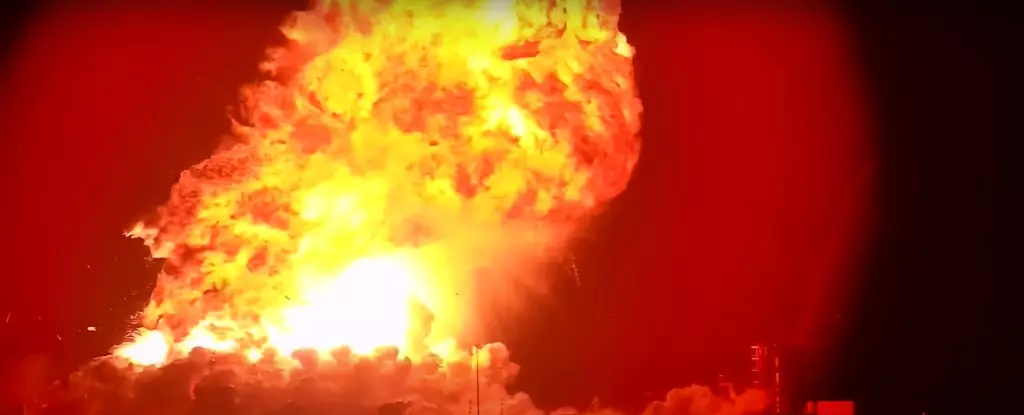The recent explosion of a SpaceX Starship during a static fire test has once again unveiled the treacherous path on which billionaire Elon Musk has embarked. This incident, which occurred at the Starbase facility in Texas, is not merely a technical glitch; it is a significant blow to Musk’s audacious ambition of creating a human colony on Mars. While Musk’s ventures are often cloaked in the rhetoric of innovation and progress, one cannot overlook the weighty implications that accompany these failures.
This incident, described with a nonchalant “just a scratch” by Musk himself, reflects a broader pattern within the aerospace industry, particularly within SpaceX’s highly publicized experimental approach. While the ethos of “fail fast, learn fast” has its merits, it raises alarming questions about accountability and the consequences of failure. Is this mindset fostering a culture where catastrophic setbacks become normalized in the pursuit of interplanetary colonization?
The Public Perception and Responsibility
SpaceX’s narrative is masterfully crafted, portraying its rockets as marvels of engineering. However, the public’s fascination with these technological spectacles can detract from a crucial aspect: the safety and environmental considerations of such ambitious endeavors. This latest explosion disrupted not only the hopes pinned on Mars exploration but also posed potential risks to the surrounding environment. Despite assurances that personnel were safe and accounted for, the ignited fires at the test site were a vivid reminder that the dream of space travel must contend with earthly realities.
Environmentalists and local communities are increasingly concerned about the implications of Musk’s grand designs. The Federal Aviation Administration’s recent approval to increase rocket launches—from five to twenty-five annually—has drawn criticism, particularly from conservation groups who argue that such an expansion could threaten local wildlife, including endangered species like sea turtles and shorebirds. In a world already struggling with the consequences of climate change, the relentless push for space exploration raises ethical questions about our responsibility to both the Earth and its inhabitants.
A Fragile Innovation Landscape
As we observe SpaceX’s string of failed launches, with each mishap being met with a shrug from Musk, we must reflect on the sustainability of such a model. While Musk may treat the lost prototypes as minor setbacks, these failures chip away at the credibility of the spaceflight enterprise and its promises of a bright, interplanetary future. Each explosion is a costly reminder that innovation is a precarious endeavor, and the implications of failure extend beyond the confines of a launch pad.
Furthermore, Musk’s exaggeration of the technological prowess exhibited by SpaceX can mask the fragility of this ambitious program. The reliance on the Super Heavy booster, coupled with incidents involving pressurized tanks, reveals systemic vulnerabilities that must be addressed. The proud claims of reusable rockets and rapid turnaround times should not skirt fundamental engineering principles that prioritize safety and reliability.
The Quest for Mars: A Mirage of Progress
What becomes increasingly evident is that SpaceX’s journey toward Mars is veering toward the surreal. Each explosive setback invites speculation on whether Musk’s ambition is truly within reach or if it is merely a mirage, drawing attention and investment away from more grounded scientific endeavors. The passion for exploration is palpable, but it is essential to balance enthusiasm with pragmatism.
The repeated failures have prompted experts to question whether the technology is evolving fast enough to meet the lofty goals set forth by Musk. After all, the history of space exploration is littered with dreams cut short by technical challenges. Can we genuinely afford to accept failure as a step toward success, especially when human lives may one day depend on these systems?
Ultimately, as SpaceX barrels down its precarious path toward Mars colonization, we must remain deeply critical of both the rhetoric surrounding spaceflight and the realities looming back on Earth. Space exploration is not merely a lofty ambition; it encapsulates the responsibilities of innovation, environmental stewardship, and ethical accountability. Only time will tell if SpaceX’s journey will prevail or become another cautionary tale in our pursuit of the cosmos.

